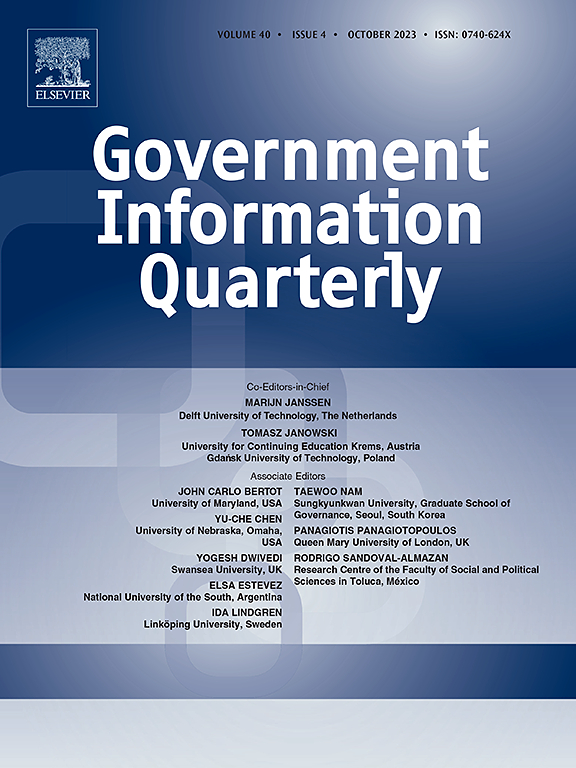A theory of the infrastructure-level bureaucracy: Understanding the consequences of data-exchange for procedural justice, organizational decision-making, and data itself
IF 7.8
1区 管理学
Q1 INFORMATION SCIENCE & LIBRARY SCIENCE
引用次数: 0
Abstract
The interconnectedness of government organizations through data-exchange is proliferating. This is relevant for many debates in public administration today since all applications of data-driven government rest on a foundation of data. In this article, rather than focusing on specific applications, we analyze the way supra-organizational data-exchange shapes such applications and specifically automated administrative decision-making (AADM). We argue that the whole of bureaucracy that is connected through data-exchange implies the organizational separation of the collection or gathering of government data from the exchange, modification, combination and/or analysis and subsequently its (re)use in decision-making processes. To analyze the consequences of this new division of labor we further develop the concept of the infrastructure-level bureaucracy and formulate hypotheses on its consequences for data itself, organizations, and citizens. Ultimately, we argue infrastructural information flows pose challenges for democratic control and for procedural lawfulness in the constitutional state.
基础设施级官僚主义理论:理解数据交换对程序公正、组织决策和数据本身的影响
政府组织之间通过数据交换的相互联系正在激增。这与今天公共管理中的许多辩论有关,因为数据驱动型政府的所有应用都建立在数据的基础上。在本文中,我们不关注特定的应用程序,而是分析超组织数据交换如何塑造这些应用程序,特别是自动化管理决策(AADM)。我们认为,通过数据交换连接起来的整个官僚机构意味着政府数据的收集或收集与交换、修改、组合和/或分析以及随后在决策过程中的(重新)使用之间的组织分离。为了分析这种新的劳动分工的后果,我们进一步发展了基础设施级官僚主义的概念,并就其对数据本身、组织和公民的影响提出了假设。最后,我们认为基础设施信息流对民主控制和宪政国家的程序合法性构成了挑战。
本文章由计算机程序翻译,如有差异,请以英文原文为准。
求助全文
约1分钟内获得全文
求助全文
来源期刊

Government Information Quarterly
INFORMATION SCIENCE & LIBRARY SCIENCE-
CiteScore
15.70
自引率
16.70%
发文量
106
期刊介绍:
Government Information Quarterly (GIQ) delves into the convergence of policy, information technology, government, and the public. It explores the impact of policies on government information flows, the role of technology in innovative government services, and the dynamic between citizens and governing bodies in the digital age. GIQ serves as a premier journal, disseminating high-quality research and insights that bridge the realms of policy, information technology, government, and public engagement.
 求助内容:
求助内容: 应助结果提醒方式:
应助结果提醒方式:


